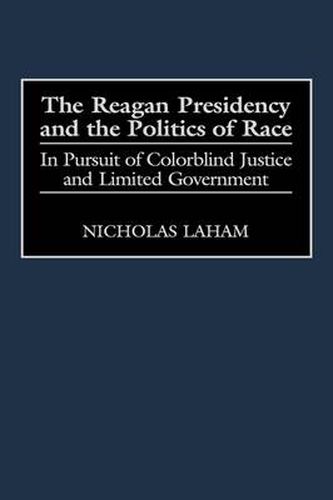Readings Newsletter
Become a Readings Member to make your shopping experience even easier.
Sign in or sign up for free!
You’re not far away from qualifying for FREE standard shipping within Australia
You’ve qualified for FREE standard shipping within Australia
The cart is loading…






Laham analyzes perhaps the most politically controversial element of Reagan’s conservative agenda, involving his attempt to curtail federal enforcement of civil rights laws. The book focuses on the major initiatives Reagan pursued in his attempt to curb enforcement of those laws: first, his efforts to reform affirmative action by prohibiting mandatory employer use of minority and white female hiring goals, and second, his veto of the Civil Rights Restoration Act.
Reagan’s academic critics argue that the president was politically motivated in his efforts to curtail federal enforcement of civil rights laws by his desire to appeal for the support of working-class whites, many of whom harbor racial resentments against minorities. Reagan’s historical reputation suffers from his attempt to curb enforcement of those laws, which has fostered charges by his critics that he was cynical and manipulative, though outwardly pleasant and likable; a president who shamelessley played the race card for his own political gain. Laham challenges the conventional notion that Reagan was an ardent practitioner of the politics of racial division. Rather, he argues that Reagan’s civil rights policy was determined by his philosophical commitment to colorblind justice and limited government, two core principles of his conservative agenda. This is a controversial survey important to students and scholars of contemporary American politics, public policy, and race relations.
$9.00 standard shipping within Australia
FREE standard shipping within Australia for orders over $100.00
Express & International shipping calculated at checkout
Laham analyzes perhaps the most politically controversial element of Reagan’s conservative agenda, involving his attempt to curtail federal enforcement of civil rights laws. The book focuses on the major initiatives Reagan pursued in his attempt to curb enforcement of those laws: first, his efforts to reform affirmative action by prohibiting mandatory employer use of minority and white female hiring goals, and second, his veto of the Civil Rights Restoration Act.
Reagan’s academic critics argue that the president was politically motivated in his efforts to curtail federal enforcement of civil rights laws by his desire to appeal for the support of working-class whites, many of whom harbor racial resentments against minorities. Reagan’s historical reputation suffers from his attempt to curb enforcement of those laws, which has fostered charges by his critics that he was cynical and manipulative, though outwardly pleasant and likable; a president who shamelessley played the race card for his own political gain. Laham challenges the conventional notion that Reagan was an ardent practitioner of the politics of racial division. Rather, he argues that Reagan’s civil rights policy was determined by his philosophical commitment to colorblind justice and limited government, two core principles of his conservative agenda. This is a controversial survey important to students and scholars of contemporary American politics, public policy, and race relations.